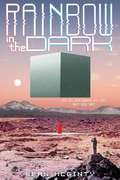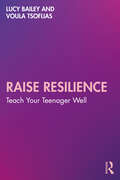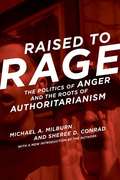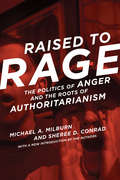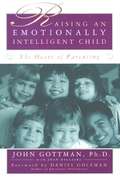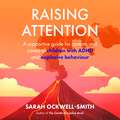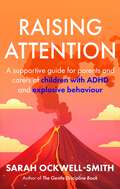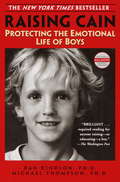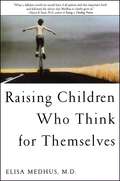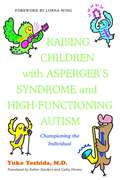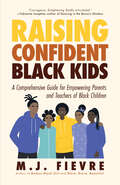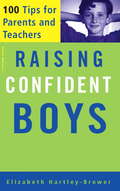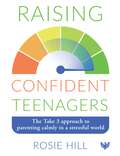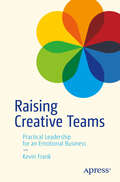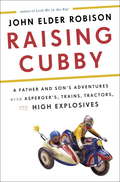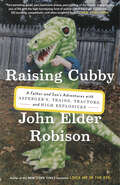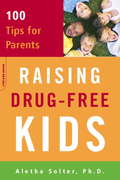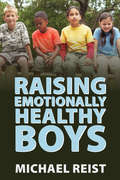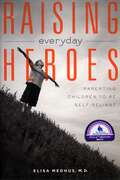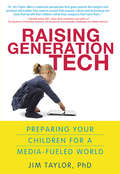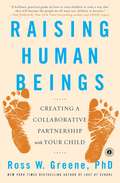- Table View
- List View
Rainbow in the Dark
by Sean McGintyThe Wizard of Oz meets Ready Player One in this darkly comic YA novel about identity, depression, giving up, and finding your way home.High school senior Rainbow is trapped with three other teens in a game-like world that may or may not be real. Together, they must complete quests and gain experience in order to access their own forgotten memories, decode what has happened to them, and find a portal home. As Rainbow&’s memories slowly return, the story of a lonely teen facing senior year as the new kid in a small town emerges. Surreal, absurdist humor balances sensitively handled themes of suicide, depression, and the search for identity in an unpredictable and ultimately hopeful page-turner that's perfect for fans of Shaun David Hutchinson, Adam Silvera, and Libba Bray's Going Bovine.
Rainbows of Intelligence: Exploring How Students Learn
by Sue TeeleThis book explores the multiple ways students process information and examines multiple intelligences through the relationship between rainbows, colors, and how individuals learn. If we consider the full range of human potential as the spectrum of the rainbow, then each individual is unique and has the potential to develop all of the intelligences using different areas of the brain. The author has included several lesson plans that can be adapted for students of any age, and has written them to meet U. S. and California standards. This book will be a valuable resource for educators and administrators, school boards, and parents.
Rainy Brain, Sunny Brain: How to Retrain Your Brain to Overcome Pessimism and Achieve a More Positive Outlook
by Elaine FoxAre you optimistic or pessimistic? Glass half-full or half-empty? Do you look on the bright side or turn towards the dark? These are easy questions for most of us to answer, because our personality types are hard-wired into our brains. As pioneering psychologist and neuroscientist Elaine Fox has discovered, our outlook on life reflects our primal inclination to seek pleasure or avoid danger-inclinations that, in many people, are healthily balanced. But when our “fear brain” or “pleasure brain” is too strong, the results can be disastrous, as those of us suffering from debilitating shyness, addiction, depression, or anxiety know all too well. Luckily, anyone suffering from these afflictions has reason to hope. Stunning breakthroughs in neuroscience show that our brains are more malleable than we ever imagined. InRainy Brain, Sunny Brain, Fox describes a range of techniques-from traditional cognitive behavioral therapy to innovative cognitive-retraining exercises-that can actually alter our brains’ circuitry, strengthening specific thought processes by exercising the neural systems that control them. The implications are enormous: lifelong pessimists can train themselves to think positively and find happiness, while pleasure-seekers inclined toward risky or destructive behavior can take control of their lives. Drawing on her own cutting-edge research, Fox shows how we can retrain our brains to brighten our lives and learn to flourish. With keen insights into how genes, life experiences and cognitive processes interleave together to make us who we are,Rainy Brain, SunnyBrainrevolutionizes our basic concept of individuality. We learn that we can influence our own personalities, and that our lives are only as “sunny” or as “rainy” as we allow them to be.
Raise Resilience: Teach Your Teenager Well
by Lucy Bailey Voula TsofliasThis practical self-help guide introduces “Psychological Fitness” – a powerful combination of mental resilience and emotional well-being that can transform how your child navigates life’s challenges. It provides brain training methods that parents and teachers can adopt and use to foster skills and knowledge in children and young people, so they can successfully navigate this uncertain and ever-changing world.Sharing simple, proven techniques developed over two decades of successful programs with children and young people, you will find easy-to-implement tools that will help them express their worries and build their own solutions, alongside effective brain training methods that promote both mental and physical health. These will empower you to help your teenagers embrace their unique identity and develop crucial life skills. Through practical exercises, they will build a foundation of resilient thinking, emotional awareness, optimism, and empathy – essential abilities that support their well-being now and throughout adulthood.Whether you’re a parent or work with children professionally, this straightforward guide offers life-changing opportunities to support the young people in your care. The refreshingly simple techniques can be implemented right away, creating lasting positive impacts on mental and emotional health.
Raised to Rage: The Politics of Anger and the Roots of Authoritarianism
by Michael A. Milburn Sheree D. ConradPoliticians routinely amplify and misdirect voters' anger and resentment to win their support. Opportunistic candidates encourage supporters to direct their anger toward Mexicans, Muslims, women, protestors, and others, rather than the true socioeconomic causes of their discontent. This book offers a compelling and novel explanation for political anger and the roots of authoritarian political attitudes. In Raised to Rage, Michael Milburn and Sheree Conrad connect vociferous opposition to immigrants, welfare, and abortion to the displacement of anger, fear, and helplessness. These emotions may be triggered by real economic and social instability, but Milburn and Conrad's research shows that the original source is in childhood brutalization or some other emotional trauma. Their research also shows that frequent experiences of physical punishment in childhood increase support in adulthood for punitive public policies, distorting the political process. Originally published in 1996, reprinted now with a new introduction by the authors that updates the empirical evidence and connects it to the current political situation, this book offers a timely consideration of a paradox in American politics: why voters are convinced by campaign rhetoric, exaggeration, and scapegoating to vote against their own interests.
Raised to Rage: The Politics of Anger and the Roots of Authoritarianism (The\mit Press Ser.)
by Michael A. Milburn Sheree D. ConradAn argument that voter anger and authoritarian political attitudes can be traced to the displacement of anger, fear, and helplessness.Politicians routinely amplify and misdirect voters' anger and resentment to win their support. Opportunistic candidates encourage supporters to direct their anger toward Mexicans, Muslims, women, protestors, and others, rather than the true socioeconomic causes of their discontent. This book offers a compelling and novel explanation for political anger and the roots of authoritarian political attitudes. In Raised to Rage, Michael Milburn and Sheree Conrad connect vociferous opposition to immigrants, welfare, and abortion to the displacement of anger, fear, and helplessness. These emotions may be triggered by real economic and social instability, but Milburn and Conrad's research shows that the original source is in childhood brutalization or some other emotional trauma. Their research also shows that frequent experiences of physical punishment in childhood increase support in adulthood for punitive public policies, distorting the political process. Originally published in 1996, reprinted now with a new introduction by the authors that updates the empirical evidence and connects it to the current political situation, this book offers a timely consideration of a paradox in American politics: why voters are convinced by campaign rhetoric, exaggeration, and scapegoating to vote against their own interests.
Raising A Happier Mother: The empowering guide to motherhood and must-read book for any new mum
by Anna MathurTHE PERFECT, THOUGHTFUL GIFT FOR THE MUM IN YOUR LIFE!This isn't a parenting book.This isn't a guide to being a perfect parent (spoiler: they don't exist)This is a book about you.We can only anchor, nurture, nourish and instill confidence in our children when we extend the same support to ourselves. After all, how can we effectively tend to our children's needs when our energy reserves are depleted? How can we lead by example and teach our children the importance of healthy self-esteem if we are struggling with these things ourselves? There are a thousand and one ways to parent, and only one way that's authentic for you.Drawing on her work as a psychotherapist, alongside her own experiences as a mother, Anna shows that caring with our children begins with caring for ourselves, and it's time to replace exhaustion with empowerment. Far from being selfish, self-care is an essential quality of a happier mother good parent. The greatest gift you can give to to yourself and your children, is to give yourself permission to thrive.
Raising An Emotionally Intelligent Child: The Heart Of Parenting
by John GottmanIntelligence That Comes from the HeartEvery parent knows the importance of equipping children with the intellectual skills they need to succeed in school and life. But children also need to master their emotions. Raising an Emotionally Intelligent Child is a guide to teaching children to understand and regulate their emotional world. And as acclaimed psychologist and researcher John Gottman shows, once they master this important life skill, emotionally intelligent children will enjoy increased self-confidence, greater physical health, better performance in school, and healthier social relationships. Raising an Emotionally Intelligent Child will equip parents with a five-step "emotion coaching" process that teaches how to:* Be aware of a child's emotions* Recognize emotional expression as an opportunity for intimacy and teaching* Listen empathetically and validate a child's feelings* Label emotions in words a child can understand* Help a child come up with an appropriate way to solve a problem or deal with an upsetting issue or situationWritten for parents of children of all ages, Raising an Emotionally Intelligent Child will enrich the bonds between parent and child and contribute immeasurably to the development of a generation of emotionally healthy adults.
Raising Attention: A supportive guide for parents and carers of children with ADHD and explosive behaviour
by Sarah Ockwell-SmithA book for anybody who has, or works with, children (of any age) with 'out of control' behaviour, including parents, teachers and healthcare professionals. Raising Attention busts commonly believed myths surrounding ADHD and 'naughty' children, discusses up to date neuroscience and genetics research in an accessible way and provides practical tips that really make a difference to both children and the adults who care for them.Written by bestselling childcare expert Sarah Ockwell-Smith, herself a mother of a young adult with ADHD, there are plenty of heartwarming and heartbreaking personal stories included to bring the book to life.If you've ever felt exhausted, helpless, guilty, embarrassed or shamed for your child's behaviour, this supportive and non-judgemental book is for you.
Raising Attention: A supportive guide for parents and carers of children with ADHD and explosive behaviour
by Sarah Ockwell-SmithA book for anybody who has, or works with, children (of any age) with 'out of control' behaviour, including parents, teachers and healthcare professionals. Raising Attention busts commonly believed myths surrounding ADHD and 'naughty' children, discusses up to date neuroscience and genetics research in an accessible way and provides practical tips that really make a difference to both children and the adults who care for them.Written by bestselling childcare expert Sarah Ockwell-Smith, herself a mother of a young adult with ADHD, there are plenty of heartwarming and heartbreaking personal stories included to bring the book to life.If you've ever felt exhausted, helpless, guilty, embarrassed or shamed for your child's behaviour, this supportive and non-judgemental book is for you.
Raising Attention: A supportive guide for parents and carers of children with ADHD and explosive behaviour
by Sarah Ockwell-SmithA book for anybody who has, or works with, children (of any age) with 'out of control' behaviour, including parents, teachers and healthcare professionals. Raising Attention busts commonly believed myths surrounding ADHD and 'naughty' children, discusses up to date neuroscience and genetics research in an accessible way and provides practical tips that really make a difference to both children and the adults who care for them.Written by bestselling childcare expert Sarah Ockwell-Smith, herself a mother of a young adult with ADHD, there are plenty of heartwarming and heartbreaking personal stories included to bring the book to life.If you've ever felt exhausted, helpless, guilty, embarrassed or shamed for your child's behaviour, this supportive and non-judgemental book is for you.
Raising Cain: Protecting the Emotional Life of Boys
by Michael Thompson Dan KindlonThe stunning success of Reviving Ophelia, Mary Pipher's landmark book, showed a true and pressing need to address the emotional lives of girls. Now, finally, here is the book that answers our equally timely and critical need to understand our boys.In Raising Cain, Dan Kindlon, Ph.D., and Michael Thompson, Ph.D., two of the country's leading child psychologists, share what they have learned in more than thirty-five years of combined experience working with boys and their families. They reveal a nation of boys who are hurting--sad, afraid, angry, and silent. Statistics point to an alarming number of young boys at high risk for suicide, alcohol and drug abuse, violence and loneliness. Kindlon and Thompson set out to answer this basic, crucial question: What do boys need that they're not getting? They illuminate the forces that threaten our boys, teaching them to believe that "cool" equals macho strength and stoicism. Cutting through outdated theories of "mother blame," "boy biology," and "testosterone," Kindlon and Thompson shed light on the destructive emotional training our boys receive--the emotional miseducation of boys.Through moving case studies and cutting-edge research, Raising Cain paints a portrait of boys systematically steered away from their emotional lives by adults and the peer "culture of cruelty"--boys who receive little encouragement to develop qualities such as compassion, sensitivity, and warmth. The good news is that this doesn't have to happen. There is much we can do to prevent it. Kindlon and Thompson make a compelling case that emotional literacy is the most valuable gift we can offer our sons, urging parents to recognize the price boys pay when we hold them to an impossible standard of manhood. They identify the social and emotional challenges that boys encounter in school and show how parents can help boys cultivate emotional awareness and empathy--giving them the vital connections and support they need to navigate the social pressures of youth.Powerfully written and deeply felt, Raising Cain will forever change the way we see our sons and will transform the way we help them to become happy and fulfilled young men.From the Hardcover edition.
Raising Children Who Think for Themselves
by Elisa MedhusHow many of us liken parenthood to a perilous journey? As parents, we are constantly teaching our children to fend off outer evils like drugs, alcohol, gangs, violence, and suicide, as well as helping them sidestep inner pitfalls like cynicism, eating disorders, irresponsibility, and poor impulse control. These dilemmas can sometimes make our children's future appear downright bleak! In spite of all this, our job is to raise them to be successful, competent, self-confident, and independent.
Raising Children with Asperger's Syndrome and High-functioning Autism: Championing the Individual
by Lorna Wing Yuko YoshidaIf you have a child with Asperger's syndrome (AS) or high-functioning autism, conventional parenting principles will often prove insufficient and unproductive. This intelligent companion has all the answers, explanations and advice to enable parents to feel confident in providing effective support for their child with AS or high-functioning autism. The author explains how to help develop social and communication skills, clarifies the type of assistance needed from outside the family (and where to find it), and includes suggestions on how to ensure that the needs of other siblings are also met. Written from the insightful perspective of a child psychiatrist, this very practical book will provide concrete help for parents and carers. The experience and expertise shared will also be useful for all professionals working with children with AS or high-functioning autism and their families.
Raising Confident Black Kids: A Comprehensive Guide for Empowering Parents and Teachers of Black Children
by MJ FievreHow to Raise Black Kids in a Racist World#1 New Release in Teacher Resources and Student LifeRaising Confident Black Kids includes everything Black and multi-racial families need to know to raise empowered, confident children. From the realities of living while Black to age-appropriate ways to discuss racism with your children, educator M.J. Fievre provides a much-needed resource for parents of Black kids everywhere.It’s hard to balance protecting your child’s innocence with preparing them for the realities of Black life. When —and how —do you approach racism with your children? How do you protect their physical and mental health while also preparing them for a country full of systemic racism? On the heels of Why Are All the Black Kids Sitting Together in the Cafeteria and “Multiplication Is for White People” comes a parenting book specifically for parents of Black kids.Now, there’s a guide to help you teach your kids how to thrive —even when it feels like the world is against them. From racial profiling and police encounters to the whitewashed lessons of history taught in schools, raising Black kids is no easy feat. In Raising Confident Black Kids, teacher M.J. Fievre passes on the tips and guidance that have helped her educate her Black students, including:How to encourage creativity and build self-confidence in your kidsWays to engage in activism and help build a safer community with and for your children —and ways to rest when you need toHow to explain systemic racism, intersectionality, and micro-aggressionsIf you found guidance and inspiration from books like The Unapologetic Guide to Black Mental Health, Mother to Son, or Breathe, you’ll love Raising Confident Black Kids.
Raising Confident Boys: 100 Tips for Parents and Teachers
by Elizabeth Hartley-BrewerBoys need to be noticed, admired, understood, and accepted to feel good about themselves. Boys who lack appropriate emotional support from the adults close to them are at risk of believing they don't fit in and are likely to act accordingly, engaging in risky behaviors-including at worst using drugs and acting out violently. Raising Confident Boys teaches readers what makes boys prone to low self-esteem and provides practical, effective tips for managing these situations as they arise.
Raising Confident Teenagers: The Take 3 Approach to Parenting Calmly in a Stressful World
by Rosie HillThis book is about relationship, about building rapport and understanding between parents and teenagers at a stage when it's easy for relationships to crumble or sour. It's also about behaviour: tricky adolescent behaviour but also our own (perhaps sometimes tricky), adult behaviour. It's packed with skills and strategies proven to help parents communicate effectively with their children and develop their confidence. It's a book for all parents (or carers) but it's a particularly valuable resource for those whose adolescents are exhibiting behaviour that's challenging, or whose mental state is causing concern. Many young people are suffering since Covid/lockdown, and support services often lack funding. When children suffer, parents suffer - they too need support. It's based on the principles of the evidence-based Take 3 parenting course, written by the author when she was employed as a parenting worker for the Youth Offending Service.
Raising Creative Teams: Practical Leadership for an Emotional Business
by Kevin FrankThere are a lot of books out there on how to be a creative professional. And a lot of schools where you can learn to be a creative professional. But let&’s say you find success on your chosen path, and they put you in charge of other creative professionals. Nobody tells you what to do then. Now they do. This book is a step-by-step guide to leading creative teams. You&’ll learn what a creative leader&’s job is (helping your team be more successful) and what it&’s not (telling people what to change about their work). How to have one-to-ones. What a one-to-one is in the first place. How to build creative culture. How to hire the right people. How to give feedback in a way that teams will listen. How to sell work. How to establish your creative vision. And most importantly, how to say thank you. What You Will Learn How to build relationships through one-to-ones How to create opportunities for team members to be successful How to build a culture that supports creativity How to build and manage teams How to give creative feedback How to sell work How to establish your creative vision and build your personal brand Who This Book is For New and aspiring leaders in creative fields such as advertising, design, production, and marketing, as well as experienced leaders looking to improve their skills.
Raising Cubby
by John Elder RobisonThe slyly funny, sweetly moving memoir of an unconventional dad's relationship with his equally offbeat son--complete with fast cars, tall tales, homemade explosives, and a whole lot of fun and trouble Misfit, truant, delinquent. John Robison was never a model child, and he wasn't a model dad either. Diagnosed with Asperger's syndrome at the age of forty, he approached fatherhood as a series of logic puzzles and practical jokes. When his son, Cubby, asked, "Where did I come from?" John said he'd bought him at the Kid Store and that the salesman had cheated him by promising Cubby would "do all chores." He read electrical engineering manuals to Cubby at bedtime. He told Cubby that wizards turned children into stone when they misbehaved. Still, John got the basics right. He made sure Cubby never drank diesel fuel at the automobile repair shop he owns. And he gave him a life of adventure: By the time Cubby was ten, he'd steered a Coast Guard cutter, driven a freight locomotive, and run an antique Rolls Royce into a fence. The one thing John couldn't figure out was what to do when school authorities decided that Cubby was dumb and stubborn--the very same thing he had been told as a child. Did Cubby have Asperger's too? The answer was unclear. One thing was clear, though: By the time he turned seventeen, Cubby had become a brilliant chemist--smart enough to make military-grade explosives and bring state and federal agents calling. Afterward, with Cubby facing up to sixty years in prison, both father and son were forced to take stock of their lives, finally coming to terms with being "on the spectrum" as both a challenge and a unique gift. By turns tender, suspenseful, and hilarious, this is more than just the story of raising Cubby. It's the story of a father and son who grow up together. Praise for John Robison's first book, Look Me In the Eye:"Lean, powerful in its descriptive accuracy and engaging in its understated humor...Emotionally gripping." --Chicago Tribune"A fantastic life story told with grace, humor, and a bracing lack of sentimentality." --Entertainment Weekly"Endearing...Robison is a natural storyteller." --Boston Globe
Raising Cubby: A Father and Son's Adventures with Asperger's, Trains, Tractors, and High Explosives
by John Elder RobisonThe slyly funny, sweetly moving memoir of an unconventional dad's relationship with his equally offbeat son--complete with fast cars, tall tales, homemade explosives, and a whole lot of fun and trouble John Robison was not your typical dad. Diagnosed with Asperger's syndrome at the age of forty, he approached fatherhood as a series of logic puzzles and practical jokes. Instead of a speech about the birds and the bees, he told his son, Cubby, that he'd bought him at the Kid Store--and that the salesman had cheated him by promising Cubby would "do all chores." While other parents played catch with their kids, John taught Cubby to drive the family's antique Rolls-Royce. Still, Cubby seemed to be turning out pretty well, at least until school authorities decided that he was dumb and stubborn--the very same thing John had been told as a child. Did Cubby have Asperger's too? The answer was unclear. One thing was clear, though: By the time he turned seventeen, Cubby had become a brilliant and curious chemist--smart enough to make military-grade explosives and bring federal agents calling. With Cubby facing a felony trial--and up to sixty years in prison--both father and son were forced to take stock of their lives, finally accepting that being "on the spectrum" is both a challenge and a unique gift.nd a bracing lack of sentimentality." --Entertainment Weekly"Endearing...Robison is a natural storyteller." --Boston Globe
Raising Drug-Free Kids: 100 Tips for Parents
by Aletha SolterAdding to the successful series of "Raising" titles, a developmental psychologist gives parents tips for keeping children of all ages away from drugs and alcohol
Raising Emotionally Healthy Boys
by Michael ReistRaising emotionally healthy children is not just about what we need to do, but what we need to avoid doing. We all know that repressing our feelings can be damaging, and that emotional repression is an especially prevalent issue among males. From a very young age, boys are socialized to hide their emotions. Girls, on the other hand, are encouraged to learn a much broader range of emotional expression. The long-term repercussions of this imbalance are profound. Many of the problems we face, both as a society and as a species, are directly affected by how we raise our boys. We are all products of nature and nurture combined. The conscious and unconscious lessons we give our children often enhance and improve their human natures, but can sometimes degrade them, too. As we come to the end of thousands of years of patriarchy, we are being challenged to redefine masculinity. Our boys are lucky to be living in such a time, and luckier when they have adults in their lives who are aware of how their minds function and what they need. If we want to raise men who are strong, confident, and whole in the best sense of these words, then parents around the world urgently need a conversation about what we teach — and don’t teach — our boys.
Raising Everyday Heroes
by Elisa MedhusMany parents go to great lengths to protect their children from dangerous influences, boredom, want, and even the consequences of the kids' own choices, but Elisa Medhus believes this doesn't allow kids to develop the skills they need to be successful adults. She tells readers how to give their children opportunities to overcome adversity while still in a loving family environment, so the can develop internal wisdom, creative problem-solving skills, and basic common sense.
Raising Generation Tech
by Jim TaylorToday's children are being raised as ‘digital natives' in a world dominated by popular culture and technology. TV shows, computers, video games, social networking sites, advertisements, and cell phones too often have an unnecessarily strong-and negative#150; influence on children. But pulling the plug just isn't an option in a world where being connected is essential for success. In Raising Generation Tech, noted parenting expert Dr. Jim Taylor explores how popular culture and technology shape children's lives. The essential message from Raising Generation Tech is that excessive or unguided exposure to popular culture and technology is not good for children. Rather than offering the usual ‘end of days' scenario, Dr. Taylor offers a balanced and optimistic perspective that offers parents insights and practical information they need to ensure that popular culture and technology are tools that benefit their children rather than weapons that hurt them. Six Messages FromRaising Generation Tech: Popular culture may be the powerful influence on children today and most of that influence is not healthy to children. Children are being exposed to technology earlier than ever without proper limits or guidance. Excessive exposure to popular culture and technology has been linked to many childhood problems including shorter attention spans, lower grades in school, increased sexual activity and drug use, and obesity. Too early and unguided immersion in popular culture and technology will actually hinder rather than better prepare children for life in the digital world. Key areas in which parents should focus their child-rearing attention include their children's self-identity, values, thinking, relationships, and physical and mental health. The goal for parents is not to disconnect their children, but rather to expose them to popular culture and technology when they are developmentally ready and then give them the perspectives, attitudes, and tools they need to thrive in this digital age.
Raising Human Beings: Creating a Collaborative Partnership with Your Child
by Ross W. GreeneRenowned child psychologist and New York Times bestselling author of Lost at School and The Explosive Child explains how to cultivate a better parent-child relationship while also nurturing empathy, honesty, resilience, and independence.Parents have an important task: figure out who their child is—his or her skills, preferences, beliefs, values, personality traits, goals, and direction—get comfortable with it, and then help them pursue and live a life according to it. Yet parents also want their kids to be independent, but not if they are going to make bad choices. They want to avoid being too overbearing, but not if an apathetic kid is what they have to show for it. They want to have a good relationship with their kids, but not if that means being a pushover. They don’t want to scream, but they do want to be heard. Good parenting is about striking the balance between a child’s characteristics and a parent’s desire to have influence. Dr. Ross Greene “makes a powerful case for rethinking typical approaches to parenting and disciplining children” (The Atlantic). Through his well-known model of solving problems collaboratively, parents can forgo timeout and sticker charts; stop badgering, berating, threatening, and punishing; allow their kids to feel heard and validated; and have influence. From homework to hygiene, curfews, to screen time, Dr. Greene “arms parents with guidelines that are clear, doable, and sure to empower both parents and their children” (Adele Faber, coauthor of How to Talk So Kids Will Listen). Raising Human Beings is “inspirational…a game-changer for parents, teachers, and other caregivers. Its advice is reasonable and empathetic, and readers will feel ready to start creating a better relationship with the children in their lives” (Publishers Weekly, starred review).
